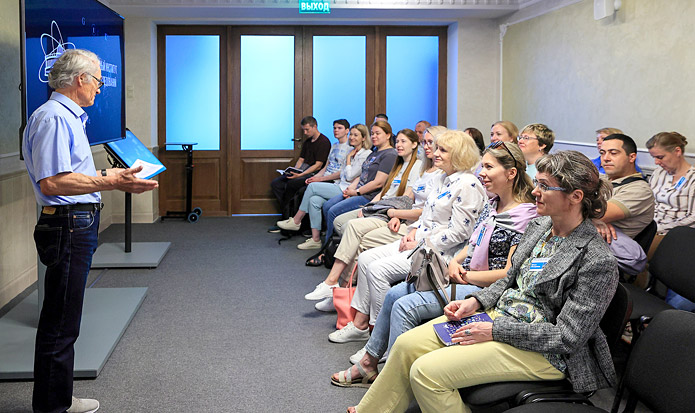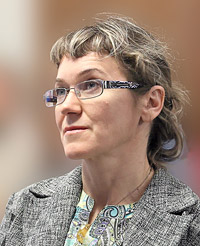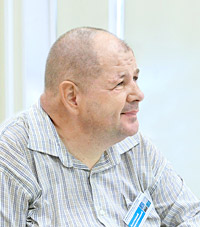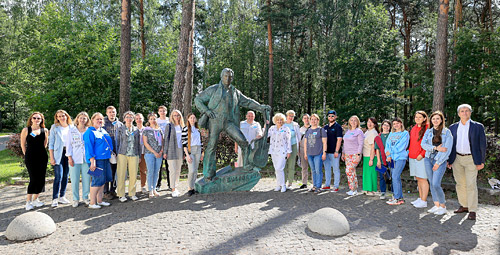
Electronic english version since 2022 |
The newspaper was founded in November 1957
| |
|
Number 26 (4674) |
Meridians of cooperation
There is a wish to come back here with students!
On 3 - 7 July, another School for teachers of physics was held at the JINR University Centre. 20 teachers from 18 regions of Russia and a teacher from Armenia participated in it.
The teachers spent a very busy week in Dubna: they learnt about the JINR basic facilities at the exhibition in the Cultural Centre "Mir", visited the VBLHEP site, the nanocenter and the SHE Factory of FLNR, the MLIT Museum and the Govorun supercomputer with excursions. In addition, they heard lectures on neutrinos, space radiobiology, the synthesis of chemical elements in nature and in the laboratory, learnt why physics needs a computer, learnt about the virtual research and laboratory workshops for schoolchildren in grades 7-9, a nuclear physics course for grades 10-11, visited Dubna University, the V.G.Kadyshevsky Lyceum, the JINR Universal Library, learnt about our city in an interesting quest. What are impressions of the School?

Ivan Lomachenkov is talking about the UC laboratory workshop
E.L.Sidorov (Samara, Aviation Lyceum No. 135): The programme is very rich and interesting. I liked that you can listen to lectures by acting scientists, visit the laboratories directly and share your experience with colleagues. This is not the first time I have participated in such schools, this one is distinguished by a narrow focus on nuclear physics that is interesting to me. I have already sent my colleagues in Samara a link to a virtual laboratory for nuclear research that can be carried out in the 11th grade, since there is no laboratory work in this area at all. In addition, the presentation with neutrinos that are not considered at all at school, is interesting, it was described in detail about the techniques of its detection and its classification was given. It was important to know, I sent the report to colleagues for further research. Of course, we will share this information with schoolchildren, but only in the 11th grade.
 Yu.F.Nasedkina (Ulyanovsk State University, Centre for Supporting the Development of Gifted Children "Scarlet Sails", Ulyanovsk): It's great that you have the opportunity to see the laboratories where they are engaged in science. To get into such fundamental laboratories, to see the synchrophasotron is a great happiness for us. Impressive photographs and names of those people whose textbooks we studied, D.I.Blokhintsev, for example. I'm just happy to be here. As a person working in science, I am extremely pleased with this, I am a theoretical physicist, I am not engaged in experimental physics. I am a university teacher and at the same time I work with schoolchildren. We were given a lot of both scientific and popular information, although, to be honest, I was expecting scientific materials a little more. I really liked everything, starting with the fact that Dubna is a city that is pleasant to come to, walk around it. Everything is perfectly organized at the School, they even came up with a quest around the city, it was extremely exciting, it turned out to be informative for us, we saw a lot of things. And I already think about a trip with the children - first, perhaps, to the cities closest to us, but here we must, probably, apply in advance and come with students or schoolchildren.
Yu.F.Nasedkina (Ulyanovsk State University, Centre for Supporting the Development of Gifted Children "Scarlet Sails", Ulyanovsk): It's great that you have the opportunity to see the laboratories where they are engaged in science. To get into such fundamental laboratories, to see the synchrophasotron is a great happiness for us. Impressive photographs and names of those people whose textbooks we studied, D.I.Blokhintsev, for example. I'm just happy to be here. As a person working in science, I am extremely pleased with this, I am a theoretical physicist, I am not engaged in experimental physics. I am a university teacher and at the same time I work with schoolchildren. We were given a lot of both scientific and popular information, although, to be honest, I was expecting scientific materials a little more. I really liked everything, starting with the fact that Dubna is a city that is pleasant to come to, walk around it. Everything is perfectly organized at the School, they even came up with a quest around the city, it was extremely exciting, it turned out to be informative for us, we saw a lot of things. And I already think about a trip with the children - first, perhaps, to the cities closest to us, but here we must, probably, apply in advance and come with students or schoolchildren.
 A.A.Berezovsky (Vladivostok, school No.82): Expectations were justified, the programme is interesting, informative, the lectures are fascinating, they add knowledge in the field of nuclear physics. Exciting laboratory classes on the equipment for registration of elementary particles, interesting classes are still ahead in the laboratory of I.A.Lomachenkov. Everything is very interesting and useful for improving the educational process, improving its quality. We have established contacts, we will access JINR educational resources and use them in our activities.
A.A.Berezovsky (Vladivostok, school No.82): Expectations were justified, the programme is interesting, informative, the lectures are fascinating, they add knowledge in the field of nuclear physics. Exciting laboratory classes on the equipment for registration of elementary particles, interesting classes are still ahead in the laboratory of I.A.Lomachenkov. Everything is very interesting and useful for improving the educational process, improving its quality. We have established contacts, we will access JINR educational resources and use them in our activities.
S.V.Meshchanova (Izhevsk, School No.74): You know, quantum physics is little reflected in school textbooks, but we want something fresh, to learn something new, we want to tell children what happens in science today. Children are very interested, they wait for quantum physics, because they read about quantum jumps, black holes, it is very interesting for them. I came to understand and tell them what happens currently in the scientific world, but we won't find anything in textbooks about modern science, you can download something from the Internet, but it's much more interesting to learn live. Of course, it's good to bring children here. And the school, in addition to everything, is also communication with other teachers, it is interesting to know their views, colleagues ask interesting questions on excursions and you also think. Here we exchange experience with teachers from all over Russia. I liked everything very much.
Argishti Tonoyan (Vanadzor, Armenia): Many thanks to the organizers for the opportunity to plunge into the world of science, get to know its modern trends and achievements. I would like to note the competent combination of the theoretical part with practice, the professionalism of lecturers that know how to involve in the topic.
Olga TARANTINA,
photo by Igor LAPENKO
